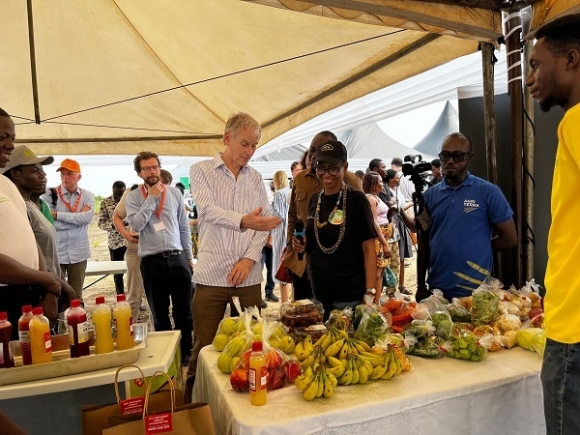
Dutch businesses explore Ghana’s horticulture market
THE Netherlands Embassy in Ghana is intensifying efforts to attract Dutch businesses to invest in the country’s fast-growing horticulture sector, positioning Ghana as a key player in West Africa’s agricultural transformation.
With Ghana’s favourable agro-climatic conditions, rising consumer demand for fresh and nutritious produce and a government push to modernise agriculture, the Embassy believes the Netherlands’ expertise in horticulture could be a game changer that will significantly boost productivity, improve agricultural value chains, and enhance export potential.
The Dutch Vice-Minister for Agriculture, Marten van den Berg, emphasised the importance of collaboration across public and private sectors, research institutions, and development partners to build a more resilient and sustainable food system in Ghana.
He was speaking to the Daily Graphic on the sidelines of a Farmer Field Day organised by Ghanaian smallholder farmers, the Horticultural Business Platform and Dutch Farmer companies with presence in Ghana to present the impact of Dutch knowledge in areas of seed development, sustainable greenhouse production, cold storage logistics, agri-financing, and training to students on farming as a business.
The Field Day followed a visit to innovative horticultural enterprises in the Volta Region, including Iribov and Fruitmaster Greenhouse as part of activities that welcomed a trade mission signalling the Netherlands' dedication to integrating development cooperation with private sector development in Ghana.
The trade mission, hosted by the Embassy of the Kingdom of the Netherlands in Ghana, together with the Netherlands-Africa Business Council (NABC), comprised a delegation of 32 Dutch agribusiness leaders of 19 Dutch companies.
Innovation
He explained that the COVID-19 pandemic had exposed vulnerabilities in global food supply chains, reinforcing the need for countries to build robust and locally driven systems that can respond effectively to shocks.
He stressed the need for Ghana to handle agriculture as a commercial venture with focus on yields, profitability and sustainability to create jobs, grow the economy and ensure food security, stating that there was so much both countries could learn from each other.
“It’s not just about food and nutrition security; it is also about entrepreneurship. Dutch farmers have set high standards for productivity, efficiency and innovation, building an agrifood industry that not only drives economic growth but also enhances food security. Ghana, too, recognises the value of innovation in agriculture. Therefore, collaboration is essential,” Mr Berg stated.
Context
Ghana’s agriculture sector, which comprises 22.2 per cent of Gross Domestic Product (GDP) and employs 40 per cent of the workforce, faces challenges meeting domestic demand for key crops such as tomatoes, peppers and onions, while horticulture emerges as a high-growth subsector with 10 per cent growth in 2024.
Despite 80 per cent of seeds coming from informal systems, imports of Dutch quality seeds have surged 55 per cent year-over-year to 2.8 million euros in 2024, making Ghana West Africa’s second-largest importer of Dutch seeds.
However, Ghana still relies heavily on food imports of fresh fruits and vegetables, indicating opportunities for deeper Netherlands-Ghana collaboration beyond just seed purchasing to develop the entire horticulture value chain.
This collaboration aligns with President Mahama’s Feed Ghana Programme launched in April 2025, which aims to boost domestic vegetable production through backyard gardening, institutional farming for youth employment and poultry industry revitalisation.
